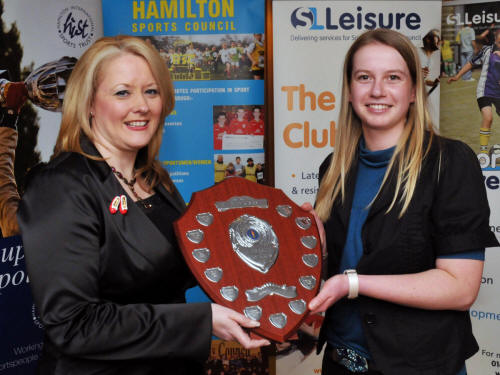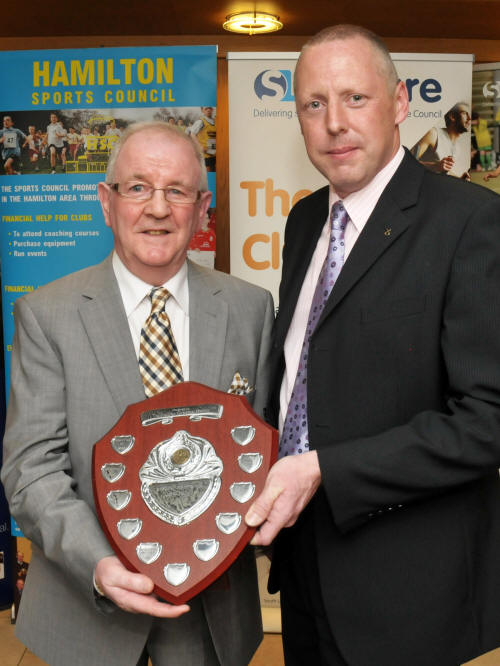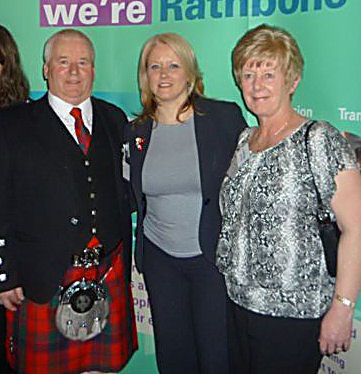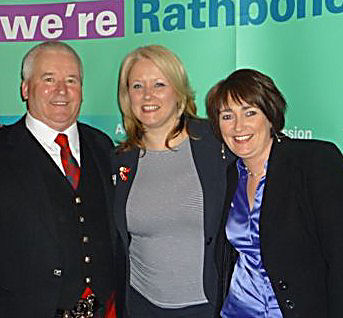Conference CallÖ.
Local Champions
Last
weekend we all scooted up the A9 for SNP
party conference it was a smashing weekend
where we got to hear from some of our fine
Westminster candidates. We have a fine bunch
fighting hard for Scotland and seats in the
upcoming election whenever that will be!!!
It seems Brown is running out of time and he
will need to gird his loins and show some
courage. He will have to face the people at
some point most likely early May and he will
be judged on things like our failed economy
caused by his negligence when regulating the
banking system. He will be called to account
for his complicity with Blair on taking our
forces into illegal wars. His performance at
the Chilcot enquiry left me cold and sick.
He will have explain his inability to defend
jobs, his failure of the vulnerable and
disabled in our country by withdrawing DLA
and he will have to take it on the chin from
the people of Scotland for the waste on
Scotland's oil and renewable energy. He will
have to justify the disgusting amount of
money committed to Trident and Son of
Trident and he will have to tell our
pensioners that they are not important as ID
cards. A shameful record as a chancellor and
a shameful record as Prime MinisterÖ.roll on
Independence thatís what I say.
On
Monday I was back in familiar territory at
the STUC in Glasgow. I was a guest speaker
at the Making Power Work for Women
Conference along with other International
speakers. We heard about a report called
Women in Power which took a look at women
ministers in the Scottish Government and
their feelings on the power they had. The
report was very narrow in that it only
detailed the thoughts and feelings of labour
party women, I felt it could have went a bit
further and certainly could have widened its
analysis to women convenors of the
parliaments committee's. och here's the
speech for you to look at.
When I
was writing my remarks for today I was
thinking about my own experiences as an MSP
in the context of the Women in Power report
that was discussed earlier on, and
reflecting on what has changed and what
remains the same. I am one of the band of
MSPs who were elected in May 1997 so am just
coming up to my third anniversary in the
job. Coming into a Parliament that was
already well established, past its teething
troubles and settling down as a mature
legislature provided, I suspect, a somewhat
different experience to that encountered by
some of the older hands Ė a term I use
strictly with regard to electoral longevity,
I must add!
In
addition, although I donít think that today
is an appropriate forum for party
politicking and itís not my intention to
make party political points, it is the case
that the Women in Power report does
represent a very narrow Ė indeed, almost a
single Ė party political perspective, and
Iíll come on to say a wee bit more about how
that means that it doesnít necessarily
reflect my own experiences or those of my
sisters in the SNP or other parliamentary
groups.
Itís a
pity, I think, that the report largely
equates political power in Scotland with
being a government Minister. That seems to
me to be a rather dated as well as an
unnecessarily narrow definition. The power
of Holyroodís committee system can be
exaggerated sometimes, but it is certainly
true that the committees have a significant
influence not just on the content of policy
and legislation but on the tone and tenor of
the way that business is conducted in the
Scottish Parliament. In their capacities as
committee members and, particularly,
conveners, women MSPs have over the past
eleven years undoubtedly not only wielded
power and influence but also often used that
power to advance important debates about
gender issues. A number of prominent women
parliamentarians of all parties have made
considerable impact in committee rather than
government Ė examples such as my SNP
colleague Christine Grahame, Labourís Karen
Gillon and the Liberal Democratsí Margaret
Smith come to mind, but there are plenty of
others. Focusing only on Ministerial power
excludes a potentially very valuable
perspective on women and power from the
report.
Nevertheless, there are elements of the
report that continue to ring true.
Politicians blaming the media when they
donít like the coverage they get is
something that, quite correctly, hacks off
the public Ė we all chose to do this after
all, knowing what the job entails in terms
of media scrutiny Ė but, although I think
things have improved since 1999, the
Scottish press pack remains a very macho
creature which tends automatically towards
an old-fashioned view of what a serious
politician looks like: i.e. very much like a
man. Many women MSPs
are
now treated with the seriousness and respect
that they deserve in media coverage of the
Parliament Ė but it has arguably taken far
longer for them to secure that status than
it would have done for many a man of
equivalent, or even lesser, talent. I doubt
there is a single woman MSP who canít think
of at least one instance where media
criticism directed at them has gone beyond
fair comment and strayed into sexist
invective. No matter how thick a skin you
try to develop it can still be, as the
comments in the report say, personally
hurtful.
There
is also still a dismissive tendency on the
part of the Scottish media to assume that
when women MSPs advance debates about gender
issues, these can safely be fenced off into
a women-going-on-about-women ghetto, where
they can be either ignored or mocked. I
thought about this recently when the
Scottish Government Justice Secretary, Kenny
MacAskill, spoke out about the way that
women are treated by the justice system and
the reasons for womenís over-representation
in our prisons. This has been a
long-standing professional and political
conviction of Kennyís and he argued, from
the basis of his own experience of working
in the system, that a strong thread of
institutional sexism runs through Scotland
justice system. He is absolutely right of
course, and the defensive and complacent
reaction of the legal establishment was no
surprise. The debate was covered fairly
prominently in the press, but I did wonder
whether the same level of serious discussion
would have been applied if Kennyís remarks
had been made by a woman politician. I
suspect that they would have been accused of
special pleading or identity politics or
even that old chestnut, ďreverse sexismĒ.
Equally, while nothing moves very quickly in
the civil service and Iíve no doubt that
there are still pockets of old-school Sir
Humphreys who are threatened by women
Ministers and Cabinet Secretaries and
respond by patronising and attempting to
marginalise them, my impression is that that
era is passing, as the colonial Scottish
Office fades into history. The Scottish
civil service as a whole now expects to work
with female Ministers, and my woman
colleagues who have served in the Scottish
Government since 2007 have largely found
themselves able to build relationships of
mutual respect with their private office
staff and other officials as well as, when
called for, stamping their Ministerial
authority on their departments as
effectively as their male colleagues. Iíve
never known Roseanna Cunningham or Nicola
Sturgeon, for example, to ever put up with
being patronised and Iím sure they had no
intention of starting to put up with it once
they entered government! As a backbench
Parliamentary Liaison Officer, I work
closely with the education ministers and
their officials and have generally found the
relationship to be a productive one.
One
observation in the report that I was very
struck by was that many of the politicians
interviewed said that they would have been
much less likely to put themselves forward
for selection and election without the 50/50
gender balance mechanism employed by the
Labour Party for the 1999 elections. Again,
this is an area in which the representation
of voices from other political parties in
the report might have given a much more
rounded picture, because that experience
certainly doesnít reflect my own or that of
other women in the SNP parliamentary group.
The SNP never adopted any formal gender
mechanism in 1999, but women were
nonetheless supported to stand for
selections, were elected and have continued
to be so at each Scottish election; indeed,
throughout its history, the SNP has always
prominently featured women among its leading
ranks, who have served as a living example
to younger activists. I say this not to
argue that the SNP is more woman-friendly
than the other parties Ė I donít think it is
- just to show that a discussion about how
the different cultures of the different
parties and movements variously encourage or
block the political ambitions of their women
activists would give us a fuller picture
than the mono-party one provided in the
report. That might be a productive
area for future research.
Mention of gender mechanisms brings me to
the issue of representation and, while I
donít want to dwell very long on this as it
will be well covered elsewhere today, I
share othersí concerns that the numbers of
women MSPs fell back in 2007 and is in
danger of doing so again in 2011. The SNP
certainly bears some responsibility for
that. It is something that women activists
in the party are very aware of and there are
lively discussions taking place about how,
as a party, we can make sure that women are
strongly represented in our 2011 intake of
MSPs. I know that itís a matter of concern
for all the Scottish parties and I think
women MSPs can and should seek to work
together across party boundaries in the
interests of gender balance.
Having said that, it is clear that the
debate about gender representation has
changed since1999. Firstly, because it has
been matched and in my view overtaken in
urgency by the issue of ethnic minority
representation. It remains a source of great
sadness and concern that, in the eleven
years of devolution, only one Asian Scot has
been elected as an MSP. This is a subject
that deserves a conference of its own, but I
will say that I strongly believe that it is
no longer enough for any of us who stand for
equality to campaign exclusively for
representation of just one group or another.
As the writer Gary Younge observed recently,
representative democracies that exclude
significant sections of the population are
not worthy of the adjective.
Scotlandís Parliament should represent
Scotlandís people in every respect and the
campaign for equality must now reflect that
and recognise that the continuum of
inequality and prejudice as it operates in
Scottish politics applies to more than
gender, whether it focuses on formal
mechanisms or on informal ways of supporting
and encouraging individuals from
under-represented groups in society within
our political parties and wider political
system,
Secondly, we can I hope
now all agree that representation itself is
only the start. Examples from across the
world show that there is not necessarily a
correlation between
gender representation and gender equality.
South Africa, for example, has the third
highest level of womenís parliamentary
representation in the world, but the highest
per capita rate for rape. Bangladesh has its
second female prime minister in a decade
but, according to a global gender gap index
compiled by the World Economic Forum, ranks
94th in the world
for gender equality.
What really matters is how representation
translates into tackling inequality.
The report covers in
detail some of the advances in policy and
legislation relating to gender equality that
took place under previous administrations
and Iíll finish up by talking a little bit
about how the Scottish Government is
continuing and building on that work.
Firstly though, I know I said I wasnít going
to be party political today Ė although I
couldnít help but notice there are a few
party political assertions with no balancing
comment offered in the report - but I do
have to take polite issue with a comment
that Susan Dalgety made in an article that
she published in Scotland on Sunday about
the Women in Power report, where she wrote,
ďScotland's constitution has dominated our
political landscape for the past two years,
but nowhere in the national conversation has
the topic of equality been raised.Ē Thatís a
straightforward misrepresentation - just a
very brief glance at the Scottish
Governmentís National Conversation
discussion papers reveals a significant
section on equalities, which discusses how
action for equality could be enhanced within
the contexts of both devolution max and full
Independence. It says:
ďScotland is an
increasingly diverse nation and its people
have differing needs and experiences. Taking
responsibility for equal opportunities
within an independent Scotland would allow
equality legislation to be promoted and
enforced. Equality legislation would be
developed in the Scottish policy context and
to ensure coherence with legislation in
other areas such as health, education and
housing. In an independent Scotland, it
would be possible to establish clear lines
of accountability, and to determine distinct
mechanisms for securing, promotion and
enforcement of equal opportunities.Ē
It commits an independent
Scotland to abide by international best
practice on equality, including the UN
Convention on the Elimination of
Discrimination against Women.
Now Susan Dalgety and
others are, of course, entirely entitled to
take different view from me and my party on
the question of Scotlandís constitutional
future and to argue against Independence or
increased powers for the Scottish
Parliament. But they should make those
arguments on their own merits. To suggest
that support for constitutional change is
somehow incompatible with support for gender
equality, or that discussion of the
constitution has to mean that equality is
sidelined is nonsense, and militates against
opportunities for women to work across
political lines in pursuit of a shared goal
of gender equality.
It also traduces the SNP
Scottish Governmentís ongoing work on gender
equality. Thereís too much of that to
discuss in detail and Iím not going to bore
you with lists and lists of government
actions, but Iíll talk a wee bit about the
two areas identified as high level
priorities under the public Gender Equality
Duty.
The first of these is
tackling violence against women, which
builds not only on the very good work that
was carried out under previous
administrations but also on the considerable
breadth of expertise and commitment of those
taking this fight forward across Scotland.
The Safer
Lives: Changed Lives
strategy published jointly with COSLA last
June provides a blueprint for a shared
approach, with mutual pursuit of shared
aims, across the whole public sector and our
third sector partners to tackling violence
against women. It aims to increase the focus
on prevention and improve support for those
experiencing violence and abuse, including
the most marginalised women and children.
Crucially, it is informed by a definition of
gender based violence which is based on that
developed by the United Nations Declaration
on the Elimination of Violence Against Women
and which goes beyond the usual dictionary
definition of Ďviolenceí to include
physical, sexual and psychological violence
occurring in the family, within the general
community or in institutions, including:
domestic abuse, rape, incest and child
sexual abuse; sexual harassment and
intimidation at work and in the public
sphere; commercial sexual exploitation,
including prostitution, pornography and
trafficking; dowry related violence; female
genital mutilation; forced and child
marriages; and honour crimes. It gives us
the widest possible basis for understanding
and preventing violence against women as it
manifests itself throughout our society.
The second high level
Ministerial priority for gender equality is
occupational segregation.
The
Scottish Government is committed to ensuring
that girls and boys no longer face barriers
to subject and career choice at school, and
that women and men no longer face barriers
to subject choice in colleges, universities
and other training providers as well as to
employment and earnings opportunities. We
all know that gender stereotyping,
inflexible working practices and the
undervaluing of the types of work often done
by women all contribute to keeping the
gender pay gap alive and well. Itís an area
thatís crying out for concerted government
action.
Those are just a couple
of examples, but I hope that they illustrate
that the kinds of policies and actions to
promote gender equality that are discussed
in the Women in Power report certainly
didnít come to an end when that particular
group of women were no longer in power.
Equality remains not just a duty, nor even
just a policy priority, but a clear
ideological conviction for the members of
todayís Scottish Government Ė of both
genders!]
Two fantastic guest
speakers where Professor Ishita Mukhopadhyay
from the department of Economics and
Director, Women's Studies Research centre,
University of Calcutta, who presented her
research findings on women in local office
in the state of west Bengal. She told us
that India amended its constitution in 1994
to reserve one-third of its seats in
panchayats and municipalities for women.
The other speaker was
Bertha Sefu who managed the 50:50 campaign
in Malawi which sought to ensure more women
ran and where successful in the general
election of May 2009, she explained how
women made the breakthrough to win 42
parliamentary seats that year.
I was then off to
Coatbridge College for an update on the
refurbishments and the launch of the new
Personal Development Award for Resilience
and hot off the press Coatbridge has won an
award for addressing a specific and
specialised skills gap in a large
orthodontic practice at the Scotland's
Colleges Business to College awards for
2010. Well done John and all his fantastic
team at Coatbridge.
It was then a
quick jump home to put on my frock and
head to the Hamilton Sports Performers
of the Year 2009 awards. I presented the
Adult Female award
to golfer Pamela Pretswell and cheered
on the other winners, who were:
Junior Female: Kirsty Gilmour
(Badminton)
Junior Male: Ross Inglis (Rugby)
Adult
Male: Daryn Duncan (Tae Kwon Do)
Senior Team: Peter & Stephen McGuire (Boccia)
Junior Team: Hamilton Academicals Girls
Football U17
Club
of the Year: Blantyre Miners Amateur
Boxing Club
Coach
of the Year: Jim Ross (Karate).
And I even got some pictures too...


Pamela Pretswell
receiving her award from Christina McKelvie
MSP and South Lanarkshire councillor and
chair of Hamilton Sports Council, Graeme
Horne, presenting the Team of the Year.
Graeme is also our Westminster champion in
Rutherglen and Hamilton.
It was back through to Edinburgh on
Wednesday for equal opportunities committee
and I was the proud host of the Scottish
Social Services Council reception in honour
of the new
CHILDHOOD PRACTICE
AWARD Ė DELIVERING BRIGHTER FUTURES. Itís a
smashing award and 600 people have taken the
plunge since 2008, upskilling themselves to
better serve society, developing a highly
qualified workforce delivering services that
give children the best start in life. Its
qualifications like this that are world
leading and will ensure the we really do Get
it Right for Every Child. I wish SSSC every
success in this new venture and I am sure
that it will enable parishioners to deliver
a fantastic service to our kids and help
them along the road to a really bright
future.
More Education committee
on Wednesday and chamber duty on Wednesday
afternoon led on nicely to the Rathbone
Scotland Achiever of the Year in the garden
lobby where a wonderful man called Junior
Robertson won an award for the amazing work
he does with young people who need some
extra support to access the world of work
and training. This is me a Junior at the
awards event.


Thursday was a full day
in the chamber to vote on 100 amendments to
the stage 3 of the Public Services Reform
(Scotland) Bill it was an extraordinary
experience as most of the votes where 62 -
63. We won all of the votes today and passed
a piece of legislation that will tidy up and
reduce the number of quangoes in Scotland.
Another example of this SNP Scottish
Government fulfilling a promise to the
people of Scotland. It also set up Creative
Scotland and I am delighted about that as my
good friend Linda Fabiani MSP had worked
very hard to bring this particular body to
fruition.
There has been so much
this week that I could fill pages but I will
keep some of that for another time. I will
speak to you again after recess but donít be
thinking I am off on a holiday I have a full
constituency programme and two fantastic
Westminster Champions to campaign for over
the next few weeks.
Have a wonderful and
peaceful Easter.
Christina McKelvie MSP
Central Scotland

